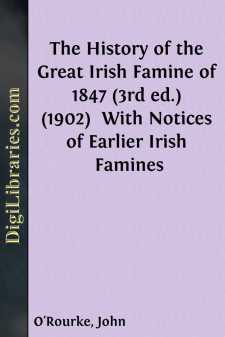Categories
- Antiques & Collectibles 13
- Architecture 36
- Art 48
- Bibles 22
- Biography & Autobiography 813
- Body, Mind & Spirit 142
- Business & Economics 28
- Children's Books 14
- Children's Fiction 11
- Computers 4
- Cooking 94
- Crafts & Hobbies 4
- Drama 346
- Education 46
- Family & Relationships 57
- Fiction 11829
- Games 19
- Gardening 17
- Health & Fitness 34
- History 1377
- House & Home 1
- Humor 147
- Juvenile Fiction 1873
- Juvenile Nonfiction 202
- Language Arts & Disciplines 88
- Law 16
- Literary Collections 686
- Literary Criticism 179
- Mathematics 13
- Medical 41
- Music 40
- Nature 179
- Non-Classifiable 1768
- Performing Arts 7
- Periodicals 1453
- Philosophy 64
- Photography 2
- Poetry 896
- Political Science 203
- Psychology 42
- Reference 154
- Religion 513
- Science 126
- Self-Help 84
- Social Science 81
- Sports & Recreation 34
- Study Aids 3
- Technology & Engineering 59
- Transportation 23
- Travel 463
- True Crime 29
The History of the Great Irish Famine of 1847 (3rd ed.) (1902) With Notices of Earlier Irish Famines
by: John O'Rourke
Description:
Excerpt
The great Irish Famine, which reached its height in 1847, was, in many of its features, the most striking and most deplorable known to history. The deaths resulting from it, and the emigration which it caused, were so vast, that, at one time, it seemed as if America and the grave were about to absorb the whole population of this country between them. The cause of the calamity was almost as wonderful as the result. It arose from the failure of a root which, by degrees, had become the staple food of the whole working population: a root which, on its first introduction, was received by philanthropists and economists with joy, as a certain protection against that scarcity which sometimes resulted from short harvests. Mr. Buckland, a Somersetshire gentleman, sent in 1662 a letter to the Royal Society, recommending the planting of potatoes in all parts of the kingdom, to prevent famine, for which he received the thanks of that learned body; and Evelyn, the well-known author of "The Sylva," was requested to mention the proposal at the end of that work.
The potato was first brought into this country about three centuries ago. Tradition and, to some extent, history attributes its introduction to Sir Walter Raleigh. Whether this was actually the case or not, there seems to be no doubt about his having cultivated it on that estate in Munster which was bestowed upon him by his royal mistress, after the overthrow of the Desmonds. Some confusion has arisen about the period at which the potato of Virginia, as I shall for the present call the potato, was brought to our shores, from the fact that another root, the batatas, or sweet potato, came into these islands, and was used as a delicacy before the potato of Virginia was known; and what adds to the confusion is, that the name potato, applied to the Virginian root, is derived from batatas, it not bearing in Virginia any name in the least resembling the word potato. Up to 1640 it was called in England the potato of Virginia, to distinguish it from the sweet potato, which is another evidence that it derived the name potato from batatas. The latter root was extensively cultivated for food in parts of America, but it never got into anything like general cultivation here, perhaps because our climate was too cold for it. It is now only found in our hot-houses, where it produces tubers from one to two pounds in weight.
It has been asserted that Sir John Hawkins brought the potato to Ireland in 1565, and his kinsman Sir Francis Drake to England in 1585. Although this is not improbable, writers generally assume that it was the sweet potato which was introduced by those navigators.
Whether or not Raleigh's third expedition, which sailed from England in 1584, was the first to bring into these countries the potato of Virginia, there can be no reasonable doubt of its having been brought home by that expedition. The story of Raleigh having stopped on some part of the Irish coast on his way from Virginia, when he distributed potatoes to the natives, is quite groundless. Raleigh was never in Virginia; for although by his money and influence, and perhaps yet more by his untiring energy, he organized nine exploring expeditions, he did not sail with any of them except the first, which was commanded by his half-brother, Sir Humphrey Gilbert. But this had to return disabled to England without touching land.
Sir Joseph Banks, the well-known naturalist, and President of the Royal Society from 1777 till his death in 1820, was at great pains to collect the history of the introduction of the potato into these countries. His account is, that Raleigh's expedition, granted to him under patent "to discover such remote heathen and barbarous lands, not yet actually possessed by any Christian prince, nor inhabited by Christian people, as to him shall seem good," brought home the potato of Virginia. This Charter bears date 25th March, 1584, and was a new and more extensive one than the first granted to him, which was in June, 1578. With this expedition sailed one Thomas Heriot, called the Mathematician, who was probably sent out to examine and report upon the natural history of such countries as they might discover. He wrote an account of Virginia, and of the products of its soil, which is printed in the first volume of De Bry's collection of Voyages. Under the article "Roots," he describes a plant which he calls Opanawk....


